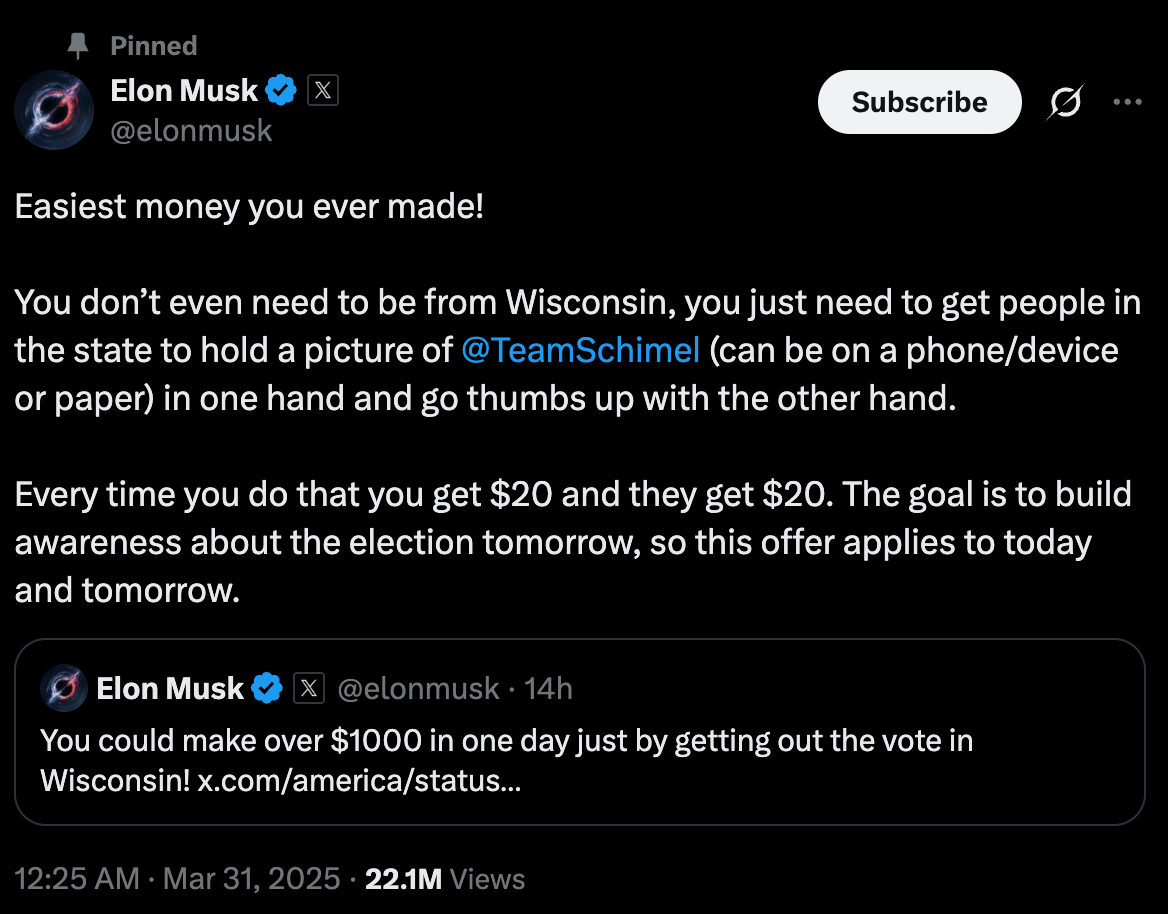Oligarchic Brain Rot
Meet the hot new argument for antitrust and high marginal tax rates
Elon Musk is a buffoon.
I’m not saying he’s exclusively a buffoon. The man clearly has some talents (if not as a manager, then at least as an investor and capital raiser). But he is a buffoon in the sense that he loudly and proudly proclaims things that aren’t true.
Here is a recent sample:
Tens of millions of dead people are collecting Social Security. (In fact, his crack team of DOGE engineers simply didn’t understand how the government’s data was coded.)
Hitler didn’t kill millions of people — public servants did. (In fact, Hitler killed millions of people.)
No one could possibly be protesting Tesla dealerships because they’re genuinely appalled by Musk’s haphazard dismantling of the federal government — it’s a conspiracy fueled by the mainstream media. (In fact, lol.)
Normally, I’m not annoyed by people being wrong on the internet. It happens all the time! But this particular wrong person happens to be the richest man on the planet. Someone who quite literally paid for the privilege of destroying critical government functions. Someone who is reshaping the Republican Party by threatening to primary any moderate who feels uneasy about signing on to the complete MAGA agenda. His buffoonery has real-world consequences in a way that your drunken uncle’s does not.
At this point, all of our brains have been poisoned (and in some ways enriched!) by online life. I would posit that the poison-to-enrichment ratio is a monotonically increasing function of how much time one spends consuming algorithmic media versus more wholesome sources (e.g., Substack, but I don’t want to talk my own book).
For our very online billionaire class, however, there is another dimension: the hordes of clout-hungry yes-men (plus a fair number of Chinese bots) who cheer their descent into madness. In this way, Elon Musk is not only a buffoon — he is pathetic: He seems to take genuine solace in the affirmation of his reply-guys.
If he weren’t doing something so transparently evil, you’d almost feel sorry for him.
Which, at long last, brings me to my point: Until recently, Americans cast a wary eye toward concentrated power, whether it lay in the hands of the government, an individual, or a tyrannical majority. There were literally Federalist Papers and Presidential Farewell Addresses about it.
The arguments against concentrated power are as simple now as they were in 1788 or 1961. The whims of a single entity should not be allowed to dictate how Americans lead their lives.
The internet merely heightens the need to take these concerns seriously. Set aside the distressing fact that the most powerful communications platforms in human history are controlled by three men (Musk, Zuckerberg, and Xi Jinping). Set aside that their wealth is similarly unprecedented. Simply consider the more banal fact that their brains have been cooked in the same way as everyone else. We’ve essentially ensured that the algorithmically-fueled delusions of a single man can threaten the lives and livelihoods of a large chunk of our country. Of the world.
Granted, billionaires have always believed stupid things (see: Henry Ford). They’ve even acted on their stupid beliefs to effect change in the real world (see again: Henry Ford, who helped disseminate the antisemitic conspiracy The Protocols of the Elders of Zion). But a difference in degree ultimately becomes a difference in kind, especially in a post-Citizens United world that allows the wealthy to spend unlimited sums of money as “protected free speech,” including on… whatever it is Elon is doing here:
These people are simply too dumb to have unlimited power.
The only solution is more muscular antitrust and higher levels of taxation — not to increase economic efficiency or boost the provision of public services (the usual arguments), but to prevent the private takeover of public resources.
It’s almost a shame! One of the wonders of American capitalism is that the least among us can enjoy many of the same services as the richest. Whether you’re a school-teacher or a billionaire, there’s no beating Amazon’s same-day delivery. Our corporate titans have done a lot for consumer welfare.
But alas, at this point, the only way to maintain order in an increasingly delusional society is to ensure that everyone’s competing delusions cancel out. We once worried about powerful people abusing their position to enrich themselves. Now we also need to worry that they’ll throw the baby out with the bathwater because they’ve convinced themselves the baby is a Venezuelan gang member.
Society’s various power brokers, each with a personalized and thus illegible form of brain rot, must be kept on a level playing field.
Call it “Checks and Balanced for the Algorithmic Era.”
I’ve been slightly tongue-in-cheek throughout this post — but only slightly.
The fact is that algorithmic information tricks us into believing we know more than we do, that we see the world more clearly than we do. They’ve even given some billionaires the confidence to upend systems they don’t understand.
Humanity created democracy in part to ensure that the whims of a particularly inbred Hapsburg couldn’t derail society. Based on the X posts of our billionaire class, algorithms and inbreeding seem equally potent ways of incubating madness.
And although we can’t completely bar our billionaires from accessing their screens, we can at least limit the damage they’re capable of doing.
If that sounds similar to how modern parents deal with unruly toddlers, then, well… I leave the implications to you.



